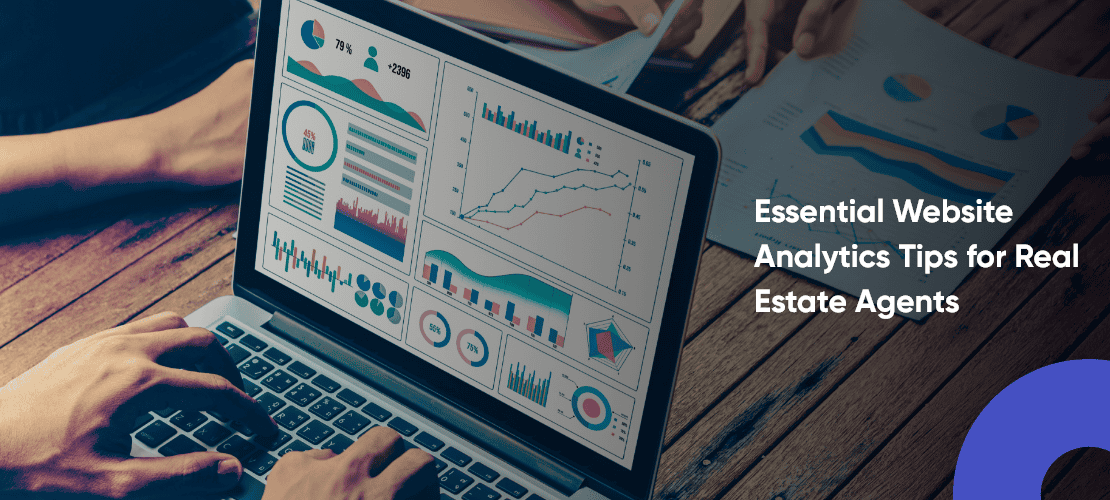Essential Website Analytics Tips for Real Estate Agents

- By BidHom Team
-
 Published on September 4, 2024
Published on September 4, 2024
 8 minutes read
8 minutes read
The digital age calls for solutions that can gauge the users’ intent successfully and meet their expectations accurately. The real estate sector is now evolving as more home buyers and sellers explore online options in search of properties. Many real estate agents have built their robust digital presence, but measuring the ROI inaccurate metrics remains a question for many. Web analytics enables one to understand certain details or aspects that are useful in improving the existing strategy. In more practical terms, it allows realtors to know how their real estate website is performing when it comes to generating leads and driving traffic.
Here are some ways through which website analytics can be used to get better results and edge out competitors.
Why is Website Analytics Important?
Real estate web analytics is not a modern-day gimmick but a strategic asset that will change how realtors approach real estate marketing. It does more than just interpret the data for you.
Enhanced User Experience
It helps realtors identify problem areas like slow loading, broken links, or poor mobile performance. By solving these, agents can ensure a smooth user experience that will greatly help with higher engagement rates and client satisfaction.
Better Audience Understanding
User data can offer insight into the demographics, interests, and behaviors of people coming to your website. Knowing the needs and preferences through reliable real estate web analytics will help you tailor accordingly with relevant content and activities for marketing purposes.
Effective Tracking of the Marketing Campaign
It is important to know exactly where your traffic is coming from—organic search, social media, or paid advertising. Now that will help you know how to optimize ad spend and focus on the channels that really drive the best ROI.
Improved Lead Generation
Learning which of the pages or actions on your website generate the maximum conversions is important to optimize the website. You can know what makes a visitor act; this will help fine-tune your lead generation strategies and increase conversion rates.
Get Ahead of Competition
Comparing performance against competitors to know where you can improve and where you have the chance to capitalize on market opportunities helps you get ahead of the competition. This competitive analysis keeps you at the forefront of changing times in real estate.
Better SEO and content strategy
Using data to improve and enhance your SEO efforts and your content strategy is the ultimate nectar for your SEO strategy. Having a better sense of what type of keywords and topics are driving traffic to your site means you will be better placed to optimize your content for far better search engine visibility and reach a more targeted audience.
Data-Driven Decisions
If the data is correct, then it will help you make the right decisions. It is the key to the success of your business. Be it content optimization, change in design elements, or even revision of marketing strategy—data-driven decisions are susceptible to giving positive results.
Start with Setting a Clear Roadmap
First, you will need to set clear, measurable goals for your website. What do you want to do? Your goals could be getting more property inquiries, better conversion of leads, or engaging users. Clear objectives provide direction for your website analytics and make sure that work is aligned with your bigger business strategy.
Assess your real estate website for its design, functionality, content quality, and user experience. Note down the strong points and the flaws so that you start working on the flaws first. This way, you would have set practical targets, and all your activities would be focused on your roadmap of website development and marketing.
Metrics to Lookout for Effective Real Estate Website Analytics
It is significant to understand which metrics to monitor in real estate website analytics. Here are the top metrics to look out for.
· Page Views: Start with tracking the number of times each page of your website is viewed. High-page views on some pages will indicate popular content, while low views could indicate areas that require improvement.
· Sessions: Sessions are considered instances that a user has with a website at any given time. Sessions include page views, events, and interactions. Session tracking allows one to see how users are behaving and engaging in their visits.
· Traffic Sources: You should know where exactly your traffic is coming from, be it search engines, social media, referrals, or even direct visits. It tells you which marketing channels are effective. This can help real estate agents use resources more effectively.
· Bounce Rate: This is defined as the number of visitors who enter and then leave a site, normally viewing only one page. A high bounce rate may indicate relevance problems with your content or website usability, while a low bounce rate would generally be indicative of better engagement.
· Session Duration: This is the length of time that users spend on your real estate website during a visit. The longer the session, generally, the more engaged and interested in your content users are.
· New vs. Returning Visitor: It is of key importance to monitor the ratio between new vs. returning visitors. It means whether the website attracts visitors and how well it can retain them. A high returning visitor base would tell that the website holds good content and services.
· CTR: This can be a benchmark for links, ads, or calls-to-action on your website; a higher CTR means that the elements are engaging and relevant to the users.
· Conversion Rate: This is the percentage of visitors that take the desired action on your website—be it filling out a contact form or signing up for a newsletter. This metric helps measure the effectiveness of your lead-generation strategies.
Tools that can Help Agents in Real Estate Website Analytics
To make the most of your website analytics, use the following tools:
Google Analytics
Google Analytics is a powerful tool for tracking traffic sources, user behavior, and conversions. With its help, you can customize your dashboards to monitor key metrics and set up goals to track specific actions.
Google Search Console
Digi-savvy real estate agents can monitor your site’s performance in search results, including keyword rankings and indexing status. Use this tool to resolve indexing issues and improve your SEO strategy.
Heat Maps
These tools visualize user interactions on your site, such as clicks and scroll behavior. Heat maps help you understand how visitors engage with different elements, guiding design and layout improvements.
SEO Tools
You can use ready-to-use platforms to track organic traffic, keyword rankings, and backlinks. These tools also offer insights into competitors’ SEO strategies.
CRM Integration
By syncing your CRM with your real estate website to track visitor behavior and measure the effectiveness of email campaigns and other outreach efforts, you can perform decent real estate website analytics. Integration with such tools can enhance your data analysis capabilities.
Real Estate Website Builder
A robust real estate website builder like BidHom becomes extremely instrumental in building an online presence quickly and proficiently. Most of these products feature customizable templates, integrated IDX home searching, and friendly user interfaces that have very little technical expertise required.
By choosing a real estate website builder, agents can develop an attention-grabbing website with lead capture and user engagement in mind. The analytics tools are embedded right inside their platforms, so in most cases, there’s no need for third-party services that operate independently.
Real Estate Auction Software
For real estate businesses that involve auctions, investing in online auction software with data analytics capabilities can be particularly beneficial. Platforms like BidHom track bidding activity, user engagement, and conversion rates in real time. The data provided by auction platforms can offer insights into market dynamics, bidder behavior, and the effectiveness of auction strategies, helping you make informed decisions and optimize your auction processes.
Get Expert Assistance with BidHom
Though insight into the websites’ data and the consequent analysis are very important, sometimes turning such insights into actionable strategies can be a dark lane to navigate. Real estate agents can invest in a robust real estate auction platform to get the necessary expertise to analyze complex data and roll out a result-driven strategy. With the right tech upgrade, your real estate website will not only generate visitors but also turn those visitors into clients, hence maximizing online presence and business growth.
BidHom is a leading real estate auction platform and website builder that comes with advanced data analytics capabilities to translate user data into actionable insights. The interactive dashboards are highly intuitive and allow agents to have a comprehensive view and understanding of different aspects of their business. It’s easy to monitor the performance of your real estate website with BidHom’s advanced analytics capabilities. Book a demo today to experience the power of BidHom and see how it can elevate your real estate website’s performance, drive conversions, and maximize your business growth.



Share Article